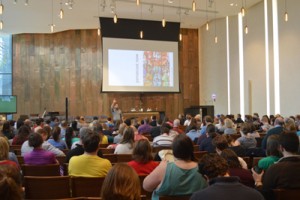
By Rosemary MacAdam
When the Rev. Alise Barrymore began her sermon with a music video, “No Church in the Wild,” by rap artists Kanye West and Jay Z, I knew the conference would live up to its tagline, “Fresh Voices, Radical Ideas”.
Throughout the next two-and-a-half days, eight youth ministers from the Diocese of Toronto were stretched and challenged to delve deeply into the three themes of the conference: the Bible, theology and race.
Representing more than a dozen denominations, 400 youth leaders from across North America gathered at Fourth Presbyterian Church in downtown Chicago in March to wrestle with the urgent justice and faith issues of today.
The gathering, called the Progressive Youth Ministry Conference, was born out of the need for mainline and progressive churches to explore youth ministry within our own traditions, since most youth ministry events and curricula cater to evangelicals.
“Often the mainline church is not seen as a major player in youth ministry,” says the Rev. Christian Harvey, the youth minister for St. John the Evangelist, Peterborough. “It was inspiring to see youth ministers from mainline churches come together and challenge that preconception. They took the conversation beyond how to get youth to go to church and asked what it means to be a youth minister in a society that is dripping with racism and commercialism.”
Speakers taught us new ways to encounter scripture. The Rev. Debbie Blue, a founding minister of House of Mercy in St. Paul, Minnesota, encouraged us to appreciate the Bible for all its contradictions and ambiguities.
“My favourite part of the conference was Debbie’s talk about the Bible and about how it’s this really intense and outrageous book full of stories,” says Melinda Suarez of St. John, West Toronto. “It gave me curiosity and excitement to look at the Bible with new eyes and to encourage my youth to look at the Bible for all the weirdness and parables that it brings.”

Frank Yamada, the president of McCormick Theological Seminary in Chicago, emphasized that “reading the Bible every day should not be the property of fundamentalists.”
Along with encouraging participants to reclaim a radical commitment to scripture, the conference wasn’t afraid to tackle serious topics and challenge the status quo. The biggest question asked by speakers was, ‘Is the church relevant today?’
The Rev. Amy Butler, who preached during the closing worship, asked hard questions about the relevance of church in people’s lives. As the new pastor of the historic Riverside Church in New York City, she asked, “In a world that considers our cathedrals and even the pulpit where Martin Luther King Jr. preached irrelevant, what is the future of our church?”
Speakers talked about racism and ongoing issues of police brutality as a defining issue of our times. In the United States, the killing of unarmed black men like Michael Brown of Ferguson, Missouri, by white police officers sparked protests and outrage across the country. Ms. Butler was among dozens of faith leaders who went to Ferguson to support the protesters. They had an honest message for religious leaders: your potlucks do nothing for us, nothing to keep black men like Michael Brown from being shot in the street.
Racism and racial profiling by police are problems in Canada as well. In Toronto, residents of low-income communities have spoken out about the racial profiling faced by many people of colour. As youth leaders, we are constantly asked by youth these poignant questions: Why be a part of the church? What is the church doing about the justice issues of today?
“One-third of Americans report never entering a church,” said Ms. Butler. “We could be afraid or we could admit our irrelevance and get creative in love.”
The conference allowed us as youth ministers to hold the question of the irrelevance of church in one hand and deep hope in the other. As Ms. Butler lamented the loss of relevance, she also spoke of the deep importance that youth ministry brings.
“Youth pastors go into the most desperate places of human becoming (adolescence) and you camp there,” she said. “Desperate times of angst and discovery call for extreme investment. Who knows where hope and possibility might be born?”
I felt a deep sense of hope, knowing that today’s progressive religious leaders are inspiring new conversations in the church. Ms. Butler’s closing comments filled me with a reverence for where the Spirit is leading. When her teenage son said he didn’t want to attend the Christmas Eve service because he didn’t believe in God, Ms. Butler wished that she had told him, “People who don’t believe in God are welcome at church. They are welcome to bring doubts and raise questions. Church is a place where love is born, and love is lived out.”
As a youth minister, I hope to welcome all youth to experience church as this: a place where love is born and lived out.
Rosemary MacAdam is the area youth coordinator for York-Credit Valley, and youth minister for St. Margaret, New Toronto.